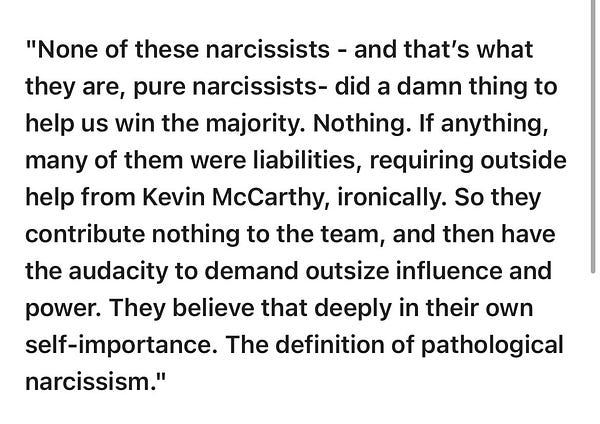| Today, the Republicans took over the House of Representatives.
The first thing they did was to remove the metal detectors that were installed after the January 6, 2021, attack on the U.S. Capitol. The removal was one of the things Republican leader Kevin McCarthy (R-CA) promised far-right Republicans in hopes of winning their votes to elect him speaker. The House has not yet voted on the rules package that ends "Democrat fines for failure of Members to comply with unscientific mask mandates and security screenings before entering the House floor," but the metal detectors are gone, just three days before the second anniversary of the January 6 attack.
So far, the removal of those metal detectors is the only concrete outcome of McCarthy's attempt to woo the extremist members of his conference.
McCarthy failed today to win the House speakership. For the first time since 1923, the speaker was not decided on the first ballot.
The reason for the failure is that the Republican conference in the House is feuding internally. On the one hand are the extremists who maintain the reason the Republicans lost ground in the last three elections is that party leadership has not gone far enough in dismantling the government. They are led by lawmakers who were key in former president Trump's attempt to overthrow the 2020 election, men like Scott Perry (R-PA), Andy Biggs (R-AZ), and Jim Jordan (R-OH). "I stand firmly committed to changing the status quo no matter how many ballots this takes," Perry tweeted. "If…McCarthy had fought nearly as hard to defeat the failed, toxic policies of the…Biden Administration as he has for himself, he would be Speaker of the House right now."
Politico's Heidi Przybyla recalled that in his 2021 memoir, former Republican speaker John Boehner said of this faction: "What they're really interested in is chaos.… They want to throw sand in the gears of the hated federal government until it fails and they've finally proved that it's beyond saving." And they are tied tightly to right-wing media: "Every time they vote down a bill, they get another invitation to go on Fox News or talk radio," he said. "Its a narcissistic—and dangerous—feedback loop."
On the other hand are Republicans like the one who spoke to CNN's Jake Tapper last night, saying that the holdouts want "procedural trickery that no one in America gives a damn about, but that might give these few loudmouths just a little bit more of the attention and power they crave…. None of these narcissists—and that's what they are, pure narcissists—did a damn thing to help us win the majority. Nothing. If anything, many of them were liabilities, requiring outside help from Kevin McCarthy, ironically. So they contribute nothing to the team, and then have the audacity to demand outsize influence and power."
The statement is important; equally important is that the source wanted to stay anonymous.
Before today, there were plenty of signs McCarthy did not have the votes he needed to become speaker. About five extremists had made it clear they would not vote for him, and another bloc of about nine Republicans had waffled. McCarthy tried to bluster his way through the uncertainty, beginning the process of moving into the speaker's office last night.
But as former White House press secretary Jen Psaki tweeted: "politics 101 rule—avoid going into a vote not knowing if you have the votes…." McCarthy revealed that he had not mastered that rule when the House began to vote. It turned out that he was down not just the five promised "no" votes, but a full 19 votes as extremists threw their support to members who share their ideology. Meanwhile, the Democrats united around Representative Hakeem Jeffries (D-NY), the House minority leader.
The results of the first ballot had Jeffries in the lead with 212 votes and McCarthy second with 203; Representative Andy Biggs (R-AZ), who was part of the effort to overturn the 2020 presidential election, had ten votes. Nine votes went to miscellaneous others.
A second ballot again saw Jeffries and McCarthy at 212 and 203 respectively. But extremists concentrated around Representative Jim Jordan (R-OH), giving him 19 votes.
A third ballot had Jeffries holding steady at 212, while McCarthy dropped a vote to stand at 202. Jordan picked up that vote to stand at 20. A dropping vote is never a good sign for a frontrunner.
And with that, the House adjourned about 5:30 p.m., sending representatives off to negotiate behind closed doors.
At stake is the direction of the Republican Party. While extremists blame their recent losses on the leadership that will not, they insist, go far enough, observers note that Republicans have lost voters who see the party as far to the right of the mainstream. Moving the party farther right is the last thing less extreme Republicans want, especially those 18 new Republican representatives from districts President Joe Biden won in 2020. An extremist House speaker will almost certainly kill their careers as two years of headlines feature members like Lauren Boebert (R-CO) lecturing and Jim Jordan yelling.
So, as McCarthy's bid for speaker bogs down, the question is whether they will accept the extremist Jordan—who is deeply implicated in the January 6, 2021, attempt to overthrow the 2020 presidential election—as speaker, or whether they will work to find a compromise candidate by working either with Democrats or with Republicans who regroup around someone who isn't Jordan. Former Republican governor of Ohio John Kasich has already called on House Republicans to work with Democrats "to pick a speaker to run a coalition government, which will moderate the House and marginalize the extremists."
But which way they will go is unclear. As congressional reporter for Punchbowl News Max Cohen reported tonight, the Republicans still have to defer to their media for direction. Representative Guy Reschenthaler (R-PA), who expects to be in the House leadership, said of the 19 voters who swung to Jordan: "We'll see what happens when Tucker and Sean Hannity and Ben Shapiro start beating up on these guys. Maybe that'll move it."
As for the man who sparked this meltdown, NBC's Garrett Haake tweeted an exclusive story: "Former President Trump declined to say if he's sticking by his endorsement of Kevin McCarthy for speaker tonight, telling me in a brief phone interview he's had calls all day asking for support, and 'We'll see what happens. We'll see how it all works out.'"
People are comparing this multiple-ballot contest to that of 1923, when Progressive Republicans forced incumbent speaker Frederick Gillett, a Republican, to accept rules changes that gave them more power before they would put him back in office. Perhaps more instructive, though, was the speaker's contest of 1855–1856, when a struggle over the future of the country created shifting coalitions that crossed party lines until, after two months and 133 ballots, representatives put Nathaniel Banks, who had ties to most of the different factions, in the speaker's chair.
Conspicuously excluded from the talking and visiting on the House floor today was newly-elected George Santos (R-NY), whose lies about his education, employment, financing, and so on would lead any healthy political party to demand an investigation of him before he took office. In this case, though, his vote for McCarthy was too important to pass up, so he sat shunned by his colleagues, alone and silent, except when called on to vote.
The House Democrats, meanwhile, organized without a hitch, putting together a leadership team that consists of Hakeem Jeffries (NY), Katherine Clark (MA), and Pete Aguilar (CA). With quite a bit of enthusiasm, the Democrats voted as a bloc to give Jeffries more votes than McCarthy, whose party is in the majority.
The Senate, too, organized easily and with what looked like a good deal of fun. Vice President Kamala Harris swore in the senators, then chatted with families and posed for pictures.
Tonight, Representative Matt Gaetz (R-FL) wrote to the Architect of the Capitol complaining that McCarthy had occupied the office of the House speaker without having been elected. "How long will he remain there before he is considered a squatter?" Gaetz asked. "Please write back promptly as it seems Mr. McCarthy can no longer be considered Speaker-Designate following today's balloting."
The first day of Republican control of the House of Representatives does not bode well for the next two years. — Notes: https://www.axios.com/2023/01/03/house-gop-removes-metal-detectors-jan-6 https://www.cnn.com/politics/live-news/new-congress-sworn-in-2023/index.html https://www.cnn.com/2023/01/03/politics/house-speaker-vote-mccarthy/index.html https://www.washingtonpost.com/opinions/2023/01/03/kevin-mccarthy-in-trouble-speaker-maga-freedom-caucus/ https://www.inquirer.com/politics/pennsylvania/scott-perry-pa-opposes-kevin-mccarthy-speaker-20230103.html https://www.rawstory.com/kevin-mccarthy-john-boehner/ https://thehill.com/homenews/house/3795829-mccarthy-struggles-to-win-support-for-speaker-with-hours-until-floor-showdown/ |














No comments:
Post a Comment